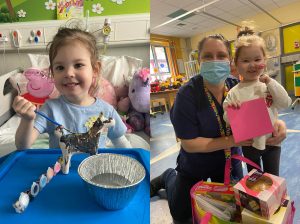
Group of Thirty Walkers Prepare for Willow’s Walk This Weekend
Willow was diagnosed with ALL in March 2023, so parents Craig, Jess and 30 other walkers will complete a symbolic fundraising walk
On Thursday 27th September, in Blood Cancer Awareness Month, Deutsche Bank employees across the UK donated their day’s salary to the bank’s two UK Charities of the Year through on ‘One Day’.
The biggest day of fundraisng in Cure Leukaemia’s history was a huge success as Deutsche Bank staff across the UK donated their salary for ‘One Day’ to benefit the bank’s two UK Charities of the Year, Cure Leukaemia and Rays of Sunshine. Star names including Gareth Southgate, Aidy Boothroyd, Will Carling, Dynamo, John Terry, Katherine Merry amongst others walked the floors of Deutsche Bank’s offices in London and Birmingham.
With the final figure expected later in the year Cure Leukaemia would like to thank all the celebrities, volunteers and of course those at Deutsche Bank who helped make the day a success.
Funds raised from One Day for Cure Leukaemia will help finance a new Therapy Acceleration Laboratory at the University of Oxford and the details of this groundbreaking project are below.
For Cure Leukaemia, the funds raised will help finance a pioneering Therapy Acceleration Laboratory at the University of Oxford which will drive the development of new personalised blood cancer therapies.
This new facility, led by Professor Paresh Vyas at the MRC Weatherall Institute of Molecular Medicine in Oxford, will apply the very latest scientific and computational analysis to blood cancer samples collected from patients treated through the national clinical trials network led by the Centre for Clinical Haematology at Birmingham’s Queen Elizabeth Hospital.
Characterisation of the genetic characteristics of large cohorts of patients treated with new drug and transplant therapies will make it possible to identify blood cancer patients who will respond (and correspondingly those who will not respond) to a specific therapy. Integration of scientific and clinical data at such an unprecedented and globally significant scale will deconvolute the complexity of cancer therapy response permitting the delivery of truly personalised medicine to patients with blood cancer.
Speaking about the aims of the project Professor Vyas, Director of the Oxford Centre for Haematology, said:
“If we think of blood cancer like a car crash we currently treat patients after the crash has occurred. Road and car safety focusses on the prevention of these accidents and that is what we now need to do with blood cancer, prevent the crash from happening.”
“Using detailed genetic analysis, we are now in a position to understand what causes blood cancer in patients. This Therapy Acceleration Laboratory will analyse samples from a large population of acute myeloid leukaemia patients to identify those who will benefit from specific therapies. Importantly, this will also ensure those who will not benefit are directed to treatments that will work for them, effectively personalising treatment for the disease.”
“We cannot expect the NHS to fund this field of research, so we are reliant on the generous support of corporate partners such as Deutsche Bank through Cure Leukaemia to make these vital strides in our understanding of blood cancer.
In ten years, the treatment of blood cancer could be unrecognisable to today but that will only happen through investment of this kind. What a legacy this would be for Deutsche Bank to have been the catalyst for the revolution in the treatment of blood cancer.”
Cure Leukaemia co-founder Professor Charlie Craddock CBE said:
“This is an unbelievably exciting time for blood cancer research. In the last decade a wave of highly effective new drug and transplant therapies have been developed which are transforming clinical outcomes.
Deutsche Bank’s twin investment into our network of accelerated clinical trial delivery coupled with this new Therapy Acceleration Laboratory, will provide huge insights into disease biology, enhance our understanding of the efficacy of pioneering treatments we are delivering and, crucially, directly benefit blood cancer patients across the UK now and in the future.”
Paul Anderson, Head of Deutsche Bank Birmingham said:
“It is incredibly exciting that Deutsche Bank has the opportunity to directly help change how blood cancer is treated across the world.
I know from conversations with Professor Craddock and Professor Vyas that there are other areas aside from fundraising where the skillset of staff within the bank will be valuable to the success of this project.
Put simply, the more engagement we have during ‘One Day’ the greater the impact on the lives of blood cancer patients today and in the future.”
As one of Deutsche Bank’s UK Charities of the Year 2018-19, funds raised for Cure Leukaemia during that period (including One Day) have the potential to exceed £2m by 2020. The project at the University of Oxford is the first stage in the transformation of the charity and further funds raised will be invested in a new accelerated clinical trials network in major centres across the UK.
Professor Craddock said: “These vital specialist research nurses will accelerate the delivery of internationally significant trials which can be integrated with individualised genomic data in collaboration with the Therapy Acceleration Laboratory at the University of Oxford.
This network will allow rapid recruitment to these potentially life-saving trials from a significantly expanded catchment region of 20 million people. These trials will not only save lives but also accelerate global progress towards effective treatments for all forms of blood cancer within 25 years.”

Willow was diagnosed with ALL in March 2023, so parents Craig, Jess and 30 other walkers will complete a symbolic fundraising walk

Faye will be tackling her first ever marathon as she prepares for the UK's second largest marathon